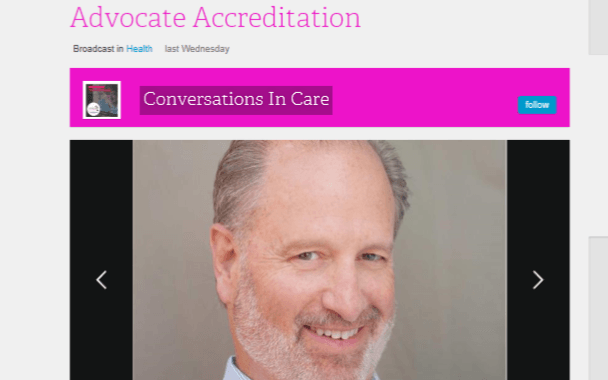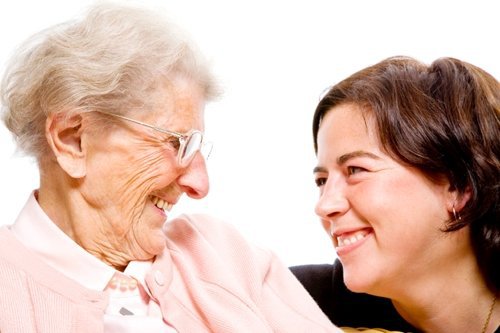|
The North American Conversation On Aging. Helping Educate About Life's Resources as We Age...
This conversation is for professional in the senior care industry, seniors, families with aging parents, friends of seniors and caregivers. Listen to the February 2016 Conversation by clicking here.
1 Comment
A National Conversation on Aging – with Brian May of Summit Life Equity Webinar
Topic: Paying for Care – Life Insurance-Life Settlements Almost 95% of us will need care…It may be for an hour or for years….How do I pay for that Care? Join our Elder-care Professionals and listen to the latest Conversation On Aging… CLICK HERE TO LISTEN TO THE CONVERSATION An Interview with Katharina Dress
Katharina Dress from Aging in Harmony talks about mediating and facilitating for elders and their family members Posted by Christopher Hewitt (Blog Writer, SevenPonds) Today, SevenPonds speaks with Katharina Dress from Aging in Harmony, an organization that provides communication support for elders and their families and caretakers. With an MA in Communications from San Francisco State University, Katharina has completed extensive training in mediation, facilitation and conflict coaching training.She now serves as a mediator on the Civil Court Mediation Panel of the Superior Court of Alameda County. She is also a coach for workshops on intercultural and empathic communication, conflict management and older adult mediation. Today, she speaks with us about the communication services she provides through Aging in Harmony. Christopher: What is Aging in Harmony? Katharina: Aging in Harmony is a service that helps families and Aging Service providers communicate effectively about the challenges of aging so that they can plan ahead in a collaborative manner and find solutions that meet everyone’s needs. Christopher: How do you get these conversations started? Katharina: I offer four different kinds of services. The first service is mediation, where I work with families and sometimes with professional caregivers and their clients, to solve problems surrounding care, estate planning or any kind of aging-related issue. I sit down with them and facilitate conversation in a safe and neutral manner so that they can really understand each other and find creative solutions that work for everyone. Secondly, In conflict coaching, I work with an individual, typically phone, to help them change the way they communicate these issues so that they can have effective conversations on their own. Many people look for this service when their family members refuse to participate; other times the family all agrees they’d rather have the conversation in private. The third service is facilitation. Sometimes, not nearly as often as I would like, families realize that it would be good idea to plan together, butthey’re afraid to have the conversation, so they get me to facilitate theconversation and help them plan together. The fourth is training. I offer workshops anywhere from half an hour to 3 days to help either people who work with older adults or family members to learn the communication skills that I use in my own work. When I have a phone conversation with a potential client, I start by listening with empathy to what’s going on with her or him, and after about half an hour of that, I say, “well do you have the sense that I really understood where you’re coming from,” and they say yes and I say, “well, would you like to hear what I do and how I might be able to help?” Christopher: Who most often comes to you for help? Katharina: Often I get referrals from other professionals, estate planning attorneys, financial managers—all are specialists whom the family might contact first. But typically, I first talk to the adult children, not the elder. The elders don’t typically initiate this process; it’s usually the adult children who get concerned about changes they observe in their parents’ life and then think that something needs to happen. Often they run into a wall when they’re trying to communicate that, so they come to me. Christopher: What if the parents aren’t up for mediation? Katharina: A lot of people are afraid this might be the case. But I offer something that few mediators offer: I’m willing to contact the other . In other words, if the daughter is worried that her mother will refuse the process, I can call her and say, without mentioning that I’m a mediator,that her daughter is worried. At that point, the older adult typically starts venting. I start by listening with empathy to what’s going on with her or him,and after about half an hour of that, I say, “well do you have the sense that I really understood where you’re coming from,” and they say yes and I say, “well,would you like to hear what I do and how I might be able to help?” Katharina’s Tips for Effective Communication between Adult Children and their Parents
Christopher: If you bring a family on board, how many sessions do these conflicts usually take to mediate? How long are your sessions? Katharina: There is nothing typical in elder mediation. The range of issues is huge. I’ve done anything from one to six sessions with a family. Sometimes the elders aren’t even involved: maybe they’ve passed and the children are in the middle of the grieving process while deciding what to do with the estate,or maybe the elders have dementia to a degree that they can’t participate in the conversation anymore. Estate planning issues, power of attorney issues, finances are all very common, and the earliest conflict in a lot of families is when to give up the car keys. With me, a session is typically 3 hours—that’s how much time it takes to accomplish anything, because first people just have to vent, get empathy and get heard. Only after a break can we usually start talking about potential solutions Christopher: What are some common issues you see? Katharina: Estate planning issues, power of attorney issues, finances are all very common. The earliest conflict in a lot of families is when to give up the car keys. But the issue I frequently see is whether to move or not to move,and if so, where. Often, the children are concerned about parents living alone and their first idea is to move them into assisted living, but there are a lot of things that they can do to make their parents’ homes a safe and healthy place to live. There can be many solutions to meet everyone’s needs. The challenge is to get the elder to accept help. Often, they do it as a gift to the children—the gift of peace of mind, which is part of the beauty of . They don’t ever have to admit they need help. Once they see what a burden it is for their children, then they accept help for their children’s sakes. Christopher: Is there anything else you would like our readers to know? Katharina: One thing is how to find a mediator. There are two websites I would recommend. Go to mediate.com and under“Type of Matter” select “Elder”. The other one is eldercaremediators.com. And foranyone in the area, I serve the greater bay area. I’d also like to mention an upcoming training that I’m offering. It’s called “Create Harmony for Family Gatherings: A Participatory Workshop forParents, Adult Children, Family and Professional Caregivers and Mediators.” It will be held on June 6-7, and you can find more information on my website. Christopher: Thank you for speaking with us today, Katharina! Katharina: Of course, thank you! See original blog post at: http://blog.sevenponds.com/professional-advice/how-can-we-open-conversations-about-aging-with-our-elderly-parents-an-interview-with-katharina-dress Caring for aging parents can be a burden for anyone, but poor women are more likely to need to take it on and to enter a financial downward spiral as a result, a recent study suggests.
Women with better financial resources can afford paid healthcare for an aging parent, which allows those women to remain in the workforce, the authors found. Bu two men with the lowest incomes end up taking care of their parents, and the expenses and lost work time involved reduces their income even further. “We looked at the relationship among parental caregiving, labor force participation and financial well being,” said lead author Yeonjung Lee, a researcher and professor at the Faculty of Social Work at the University of Calgary in Alberta, Canada. Past research had only looked at women’s situation at a single point in time, Lee told Reuters Health, “so they weren’t sure if the women were already poor before they took care of their parents, or if they became poor after they took care of their parents.” Lee’s team used three waves of information from the U.S. Health and Retirement Survey, a large population study that focuses on the transitions Americans go through as they retire. The study included survey information for 2,093 women aged 51 and older who had at least one living parent or parent-in-law during 2006, 2008 and 2010. Caregiving was defined as providing help with the activities of daily living during the previous year. At the beginning of the study period, Lee and colleagues found, there were already differences between people caring for a parent and those who were not. The 1,837 non-caregivers had a median household income of $51,200, while the 254caregivers had a median household income of $46,410. Two years later in 2008, the median income for non-caregivers rose to $52,399 and the median income for caregivers dropped to $43,607. In 2010, the financial downturn that many Americans experienced also affected the women in the study. The median income of non-caregivers dropped to $49,484, but the median income for the caregivers dropped to $40,900. Overall,the researchers found, women who cared for their parents in 2006 and 2008 had lower incomes in 2008 and 2010. As household income increased, women were 23 percent less likely to care for parents in 2008 and 12 percent less likely to care for parents in 2010. “We found that taking care of parents led to negative outcome in their financial status, but it also went the opposite direction,” Lee said. “People who had less household income and less financial resources were more likely totake care of their parents so there is this cycle that they cannot get out of -they are poor, then taking care of parents, then being poor and taking care of their parents – there’s this kind of cycle,” Lee said. Lee said further research would be beneficial, including looking at how loss of work while caring for parents might affect the social security benefits of thecaregivers when they retire. Caregivers inevitably need to take time off from work unless they have the funds to get somebody else to help out, Judy Strauss told Reuters Health. “So they end up losing work, and also then losing the ability to accumulate retirement funds, such as social security,” said Strauss, a social work erand researcher with the National Institute for Psychotherapies and the TouroCollege School of Social Work in New York City. Strauss,who was not involved in the new study, said it’s never too early for women to plan for this stage in life. “I think that siblings have to get together way before a parent needs care and setup support for the parent,” she said. “Given that adult children are dispersed all over the place, it gets difficult to take care of a parent,” Strauss said. “Getting together as a team to plan- when the parents are healthy – makes sense. But Strauss said there are also things women who find themselves in the caregiver roll can do. “Women need to give themselves the space to give themselves support – as in counseling, caregiving groups or setting up family meetings,” she said.”The caregivers need support themselves to get through some of the harder stresses of caregiving.” “And society – in terms of policy – if we don’t take care of midlife women we’re not going to be able to take care of our children or our elderly,” Strauss said. “That’s my biggest concern – that here in the United States, we carefor the children, we care for the elderly, but we forget the midlife woman who takes care of both those populations.” “There should be programs – just like maternity leave, there should also be caregiving leave,” Strauss said. Written by Kim Edmondson:
The Microsoft Store at the Westfield Valley Fair Mall in Santa Clara, California, co-hosted an event for Boomers and Seniors, with Points of Life. The event helped acquaint Boomers and Seniors with the many products and services available to families who are looking for resources for healthfulness, communication and planning for the future. The Microsoft Store helped seniors and their familes experience and learn about Microsoft products and services. Topics they addressed included Xbox sports and fitness programs, Skyping with friends, family and medical services, using Windows Phone. Points of Life helped families connect with the resources they need to plan and manage life’s stages and to retain and control their lifestyles. Their teams of professionals and specialists from legal, care, cost of care, financial services and others helped educate seniors using “Real Life” vignettes. Two more events are scheduled in the coming months. The West Valley Mall Microsoft Store will host the event again on Saturday, November 10 from 11 am to 4 pm and then at the Stanford Shopping Center Microsoft Store, on Saturday December 1st from 1pm to 3pm. The Aging Boomers radio show features experts in various areas relative to the issues boomers and their families are confronted with on an everyday basis including senior care, nutrition, insurance, financial and estate planning. Listen to the show live at www.ksvy.com from 2–3 pm PST. |






 RSS Feed
RSS Feed
